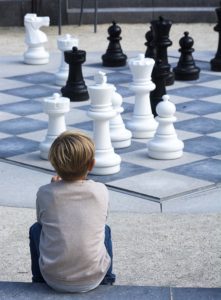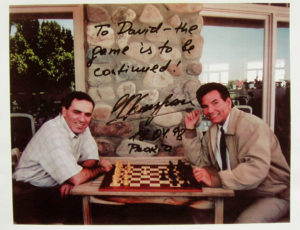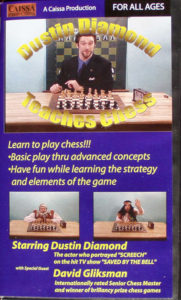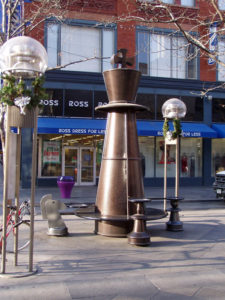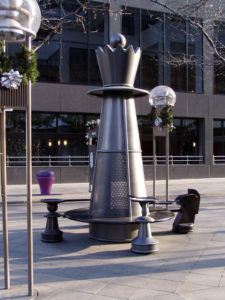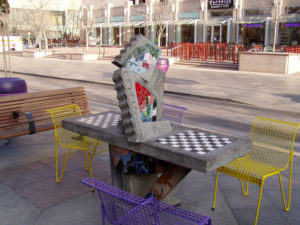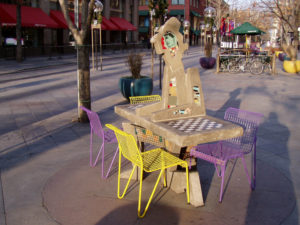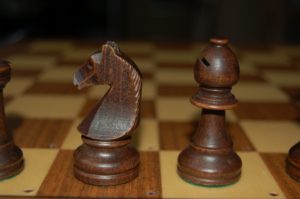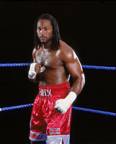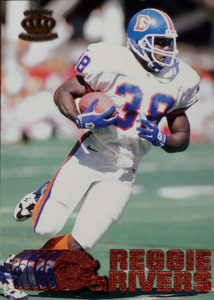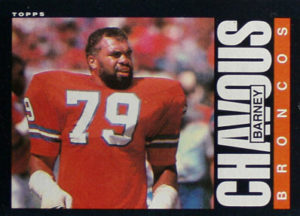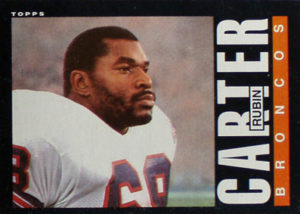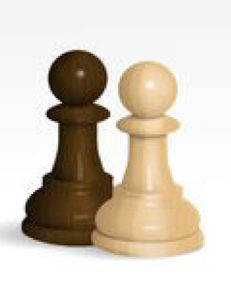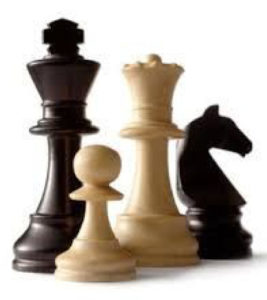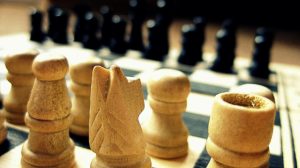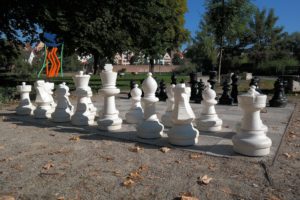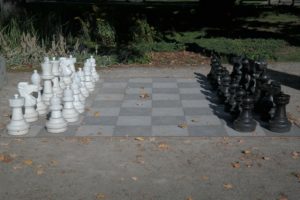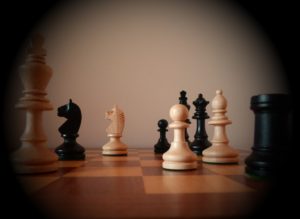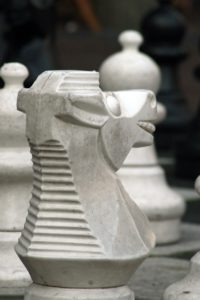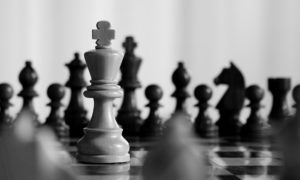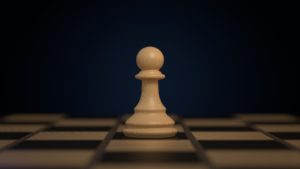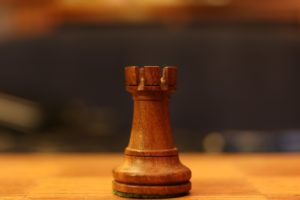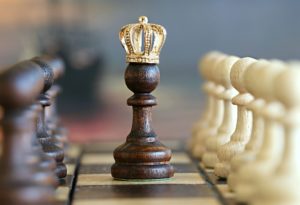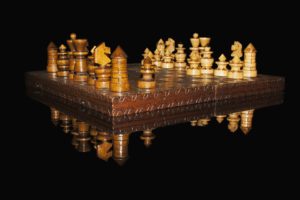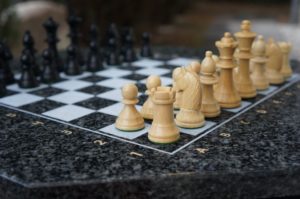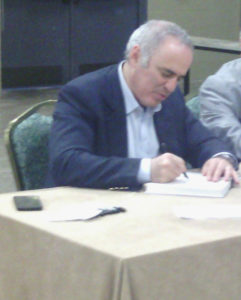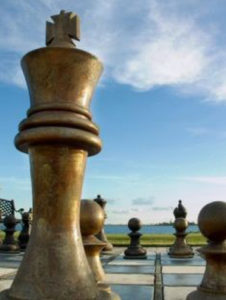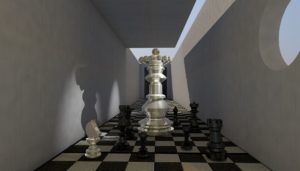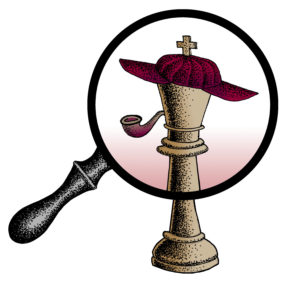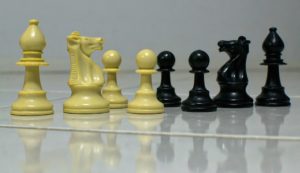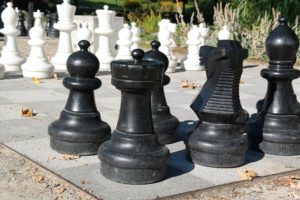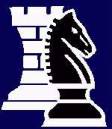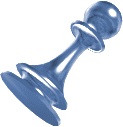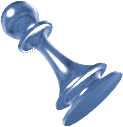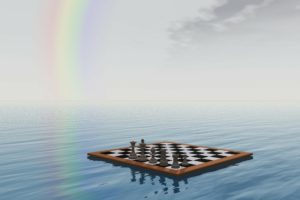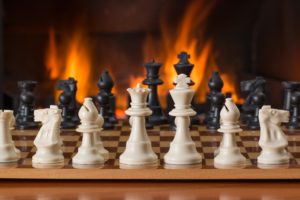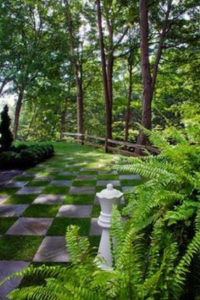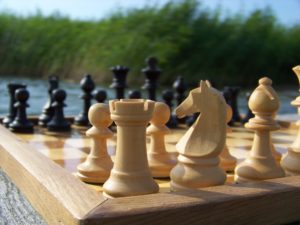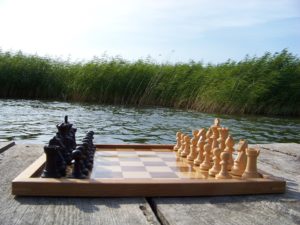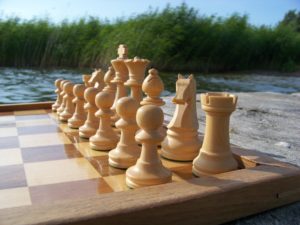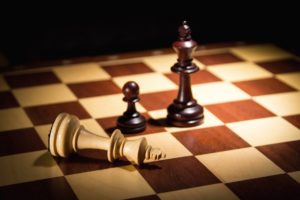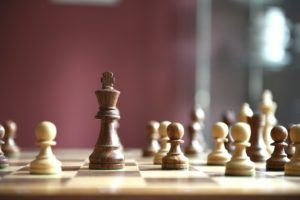Quoting part of the Introduction from Teaching Chess in the 21st Century,
“Benjamin Franklin wrote in 1779 that the game of chess “is not merely an idle amusement (since) life is a kind of chess, in which we have often points to gain, and competitors or adversaries to contend with, and in which there is a vast variety of good and evil events that are in some degree the effects of prudence or the want of it.” Franklin suggests that playing chess develops foresight, circumspection, perseverance, and sportsmanship.
Godfrey Harold Hardy, a prominent British mathematician famous for his achievements in number theory, once said, “A chess problem is an exercise in pure mathematics.” ….
Today, educators and parents have discovered that chess is a wonderful way to teach young children mathematical concepts and important thinking skills that they can use their entire life. Chess also has connections to standards in the fields of language arts (reading, writing, oral presentation), social studies (geography – longitude and latitude, mapping), and science (graphing and critical thinking skills).
Here are some other benefits of learning chess:
- Improves cognitive skills (including concentration, pattern recognition, decision making, algebraic and geometric thinking, problem-solving, spatial reasoning, and critical thinking)
- Improves self-confidence and self-worth
- Increases attention span
- Increases memory capacity
- Encourages understanding of choice and consequences for problem- solving…helps students realize that they are responsible for their actions and must accept the consequences of those actions
- Offers a logical pattern and critical-thinking system
- Provides competition, fostering interest and promoting mental alertness
- Offers a variety of quality analytical problems from which to choose
- Teaches good sportsmanship
- Improves communication through written and oral presentation skills
- Creates a learning environment organized around games, which is one of the most motivational tools in a teacher’s repertoire to encourage problem-solving and spend time quietly immersed in logical thinking.
Many studies show that chess helps children with cognitive development and increases math and verbal test scores. Educators have also noted that chess helps to raise self-esteem.”
As a Civil Engineer and Rocket Scientist, there is no doubt in my mind that chess teaches logical-thinking, decision-making, and how to methodically evaluate different choices or moves in a logical manner better than any other teaching vehicle.
Patience is one of the most important things chess teaches children. Once they learn to slow down and take their time, they discover a whole new world. They then see the complexitites of different chess positions that need to be worked out; that is when time-management skills are introduced.
Business Quotes
“In life, or in business, as in chess, one must play all sorts of positions well, seize the opportunities when available, defend if forced to, and attack when possible, but always adhere to the dictates of the truth of the position.”
David Lucky, Senior Chess Master and Entrepreneur in the computer and wireless technology industry
“Chess is a game that benefits people of all ages, especially kids, in any area of life, business, problem solving, and social skills. Chess has the unique ability to combine focus, concentration, imagination, coordination, teamwork, and leadership all at the same time.”
Dustin Diamond, Actor who portrays “Screech” from hit television show Saved by the Bell
“Chess strategic thinking helps me prepare court cases effectively because the thought processes are parallel. Preparation to win includes planning, tactics and strategy, evaluating the opposition’s position and power, coordination of all your forces to win throughout the game or the trial, and respect for your opponent at all times.”
Walter Gerash, Denver defense attorney
“As a kid, chess was the first thing I studied in a structured way that helped me gain the discipline to study medicine and become successful doctor.”
Mark Spitz, Professor of neurology at the University of Colorado and one of the nation’s leading experts in epilepsy
“The beauty and creativity of chess masterpieces as an art form gives me a sense of musical inspiration and wonder about what the human mind is capable of.”
Keith Oxman, Chess Expert and Tenor saxophone musician and recording artist for Capri Records
“Chess study is a great foundation for anyone who works with data processing because it teaches you how to analyze, classify data, and recognize patterns.”
Michael Ginat, Chess Master and Backgammon Master, Technical consultant in the computer programming field
“I have found the mental training and discipline involved in the game of chess to be very applicable to the real estate investing process. The methodical thought process, deep thinking and end game orientation required in chess are parallel to the analysis, negotiation and contract work involved with real estate investing. I believe chess is excellent mental conditioning for the real estate game or any business endeavor.”
Chuck Gargotto, Real Estate Agent/Investor
“Todd’s approach to teaching chess tactics is very reminiscent of the thinking process used by tax lawyers to resolve very complex tax problems. He suggests breaking the problem down into its elemental parts and then systematically testing the various combinations until the truth in the position becomes clear.”
Greg Hilbrich, Treasurer and Senior Vice President, Taxation, First Data Corporation
Sports
…chess is “a lot like football because you have to set up your offense and your defense, every once in a while you need to give up a piece of your team in order to make the big play. It’s a game of patience, and that pretty much defines how I run the ball. I’m patient, always looking for the opportunity and always trying to capitalize on the other person’s mistake.”
Priest Holmes, Kansas City Chiefs All-Pro running back
“I play chess about four hours a day in training camp. You have to decide what move to use, or what combination of moves. I think less when I box because the reaction time is a lot quicker, but some people call me the chess boxer because they say I think too much in the ring. I take my time and they don’t see the action they want. Some boxers just go in there and just throw punches and hope to win…”
Lennox Lewis, Boxing World Champion
“Chess has definitely helped me understand a lot of the strategy of football. In chess, good offense is often an exercise in putting multiple points of pressure on one square. In football, offensive play design (particularly passes) involves putting multiple points of pressure on one player.”
“In chess, you often give your opponent a move that looks strong for him, but it turns into a trap. Football is the same way. I’ve always thought of defense in football as being totally reactive. But now I understand the ways in which football defenses force the offense to make certain choices.”
Reggie Rivers, Denver Broncos running back
The Broncos famous “Orange Crush Defense” frequently played chess to pass the time on the plane during team trips. Back then, Rubin Carter, Steve Foley, Tom Jackson, Claudie Minor, John Rowser, Ed Smith, and later Larry Canada were the most active chess players on the Broncos team.
“Chess is a very positive way to exercise your mind. It makes you look at the whole picture…what are your options and what is the best thing to do? In football, you are mostly reacting from a defensive point of view…but you always want to be counterattacking…a similarity with chess strategy. Chess and offensive football are quite similar; you sacrifice something now to get something back later.”
Barney Chavous, Denver Broncos defensive end
“The strategies of offense and defense are very similar between chess and football. Chess really brought closeness to the team back in those days.”
Rubin Carter, Denver Broncos nose tackle
“Tennis is like a moving chess board. There are pieces on either side of the net which position for victory. You have to anticipate two and three moves in advance in order to win. I advise my students to play chess to sharpen their strategic skills in tennis.”
Scott Treibly, Tennis coach to Association of Tennis Professionals (Men’s Tour) and Women’s Tennis Association (Women’s Tour)
Famous People
“We should talk over the lessons of the day, or lose them in Music, Chess, or the merriments of our family companions.”
Thomas Jefferson (1743-1826), 3rd President of the United States
“The Game of Chess is not merely an idle amusement; several very valuable qualities of the mind, useful in the course of human life, are to be acquired and strengthened by it, so as to become habits ready on all occasions; for life is a kind of Chess, in which we have often points to gain, and competitors or adversaries to contend with, and in which there is a vast variety of good and ill events, that are, in some degree, the effect of prudence, or the want of it.”
Benjamin Franklin (1706-1790), Statesman, philosopher, inventor, scientist, musician, economist
“The chess-board is the world; the pieces are the phenomena of the universe; the rules of the game are what we call the laws of Nature. The player on the other side is hidden from us. We know that his play is always fair, just, and patient. But also we know, to our cost, that he never overlooks a mistake, or makes the smallest allowance for ignorance.”
Thomas Henry Huxley (1825-1895), English biologist
“Daring ideas are like chessmen moving forward; they may be beaten, but they may start a winning game.”
Johann Wolfgang von Goethe (1749-1832), German poet, dramatist
“The chess pieces are the block alphabet which shapes thoughts; and these thoughts, although making a visual design on the chess-board, express their beauty abstractly, like a poem. …I have come to the personal conclusion that while all artists are not chess players, all chess players are artists.”
Marcel Duchamp (1887-1968), French Artist
“You sit at the board and suddenly your heart leaps. Your hand trembles to pick up the piece and move it. But what chess teaches you is that you must sit there calmly and think about whether it’s really a good idea and whether there are other, better ideas.”
Stanley Kubrick (1928-1999), Filmmaker, producer
“Chess teaches foresight, by having to plan ahead; vigilance, by having to keep watch over the whole chess board; caution, by having to restrain ourselves from making hasty moves; and finally, we learn from chess the greatest maxim in life – that even when everything seems to be going badly for us we should not lose heart, but always hoping for a change for the better, steadfastly continue searching for the solutions to our problems.”
Benjamin Franklin (1706-1790), Statesman, philosopher, inventor, scientist, musician, economist
“The game of chess is not merely an idle amusement; several very valuable qualities of the mind are to be acquired and strengthened by it, so as to become habits ready on all occasions; for life is a kind of chess.”
Benjamin Franklin (1706-1790), Statesman, philosopher, inventor, scientist, musician, economist
“Life is like a game of chess, in which there are an infinite number of complex moves possible. The choice is open, but the move made contains within it all future moves. One is free to choose, but what follows is the result of one’s choice. From the consequences of one’s action there is never any escape.”
Shelley Smith, (I don’t know who she is…but nice quote!)
“The game of chess is a highly rigorous process which nevertheless allows for a considerable degree of imagination and intuition. The process actually has more to do with the intangible space of the intellect than the physical space of our world. The pieces and board are only markers for the mental processes which they map out.”
Rodney Cottrell, Architect who designed a building, called The Chess House, based on a Fischer-Spassky game
“The chess pieces are the block alphabet, which shapes thoughts; and these thoughts, although making a visual design on the chessboard, express their beauty abstractly, like a poem.”
Marcel Duchamp (1887-1968), French Artist
“Chess has this in common with making poetry; that the desire for it comes upon the amateur in gusts.”
A. A. Milne (1882-1956), Author of Winnie the Pooh
“Human life very much resembles a game of chess: for, as in the latter, while a gamester is too attentive to secure himself very strongly on one side of the board, he is apt to leave an unguarded opening on the other, so doth it often happen in life.”
Henry Fielding (1701-1754), British playwright & novelist
“When I reflect on our constitution, I seem as it were to contemplate a game of chess, a recreation in which we both delight. For we have a king whose dignity we strenuously defend, but whose power is very limited; the knights, and bishops, and other pieces, have some kind of resemblance to the order of nobility, who are employed in war, and in the management of public affairs; but the principal strength is in the pawns or people; if they are firmly united they are sure of victory, but if divided and separated, the battle is lost. The motions of all, as in the game of chess, are regulated by fixed laws.”
Sir William Jones (1746-1794), British philologist and studier of ancient India, and discoverer of the Indo-European language family)
“There are two classes of men; those who are content to yield to circumstances, and who play whist; and those who aim to control circumstances, and who play chess.”
Mortimer Collins (1827 – 1876), English poet and novelist
“Apart from logical thinking and planning ahead, children also learn from the feedback they get in playing chess. They can see their own thinking process in action and can start to feel responsible for their own decisions.”
Jonathan Levitt, British grandmaster
“Results show that just one year of chess tuition will improve a student’s learning abilities, concentration, application, sense of logic, self-discipline, respect, behavior and the ability to take responsibility for his/her own actions.”
Garry Kasparov, World Chess Champion
“I started playing chess when I was about 4 or 5 years old. It is very good for children to learn to play chess, because it helps them to develop their mental abilities. It also helps to consolidate a person’s character, because as it happens both in life and in a chess game we have to make decisions constantly. In chess there is no luck and no excuses: everything is in your hands.”
Vladimir Kramnik, World Chess Champion
“Whether the game is poker, gin rummy, bridge, backgammon or chess, at the top levels of play the skills rewarded are all vitally important in business. Among them are discipline, memory, coolness under pressure, psychological insightfulness, a readiness to stick to a strategy even when it produces losing streaks in the short run, and rapid and intuitive calculation of probabilities – of spotting opportunities and balancing risks against rewards.”
Forbes Magazine
“Heaven knows, we all make mistakes. That’s life – and chess.”
Woody Allen, Actor, director, comedian, author
“Excellence at chess is one mark of a scheming mind.”
Sherlock Holmes (by Sir Arthur Conan Doyle)
“A chess problem is an exercise in pure mathematics.”
Godfrey Harold Hardy (1877-1947), British mathematician, famous for his achievements in number theory
“If a ruler does not understand chess, how can he rule over a kingdom?”
Sassanian King of Kings, Khusros II (Ruled Persia from 590-628 A.D.)
“Arabian writings of the 10th century AD not only praised the beauty of chess, the authors of the period also recommended chess as an educational aid in the development of logical thinking. They also held the opinion that chess could lead to an insight into things to come, could enhance friendships, and also protect against loneliness. The Arabs became enthusiastic players and all classes of society were enchanted by the game.”
Michael Gelb, Motivational speaker and author
“But the enemy has the move, and he is about to open his full game. And pawns are as likely to see as much of it as any. Sharpen your blade!”
J. R. R. Tolkien (1892-1973), Oxford Professor, Author of The Hobbit and The Lord of the Rings
“Reductio ad absurdum, which Euclid loved so much, is one of a mathematician’s finest weapons. It is a far finer gambit than any chess play: a chess player may offer the sacrifice of a pawn or even a piece, but a mathematician offers the game.”
Godfrey Harold Hardy (1877-1947), British mathematician, famous for his achievements in number theory
“The advantage is that mathematics is a field in which one’s blunders tend to show very clearly and can be corrected or erased with a stroke of the pencil. It is a field which has often been compared with chess, but differs from the latter in that it is only one’s best moments that count and not one’s worst. A single inattention may lose a chess game, whereas a single successful approach to a problem, among many which have been relegated to the wastebasket, will make a mathematician’s reputation.”
Norbert Wiener (1894 – 1964), Mathematician famous for work in the area of communication theory
“Nature supplies the game of chess with its implements; science with its system; art with its aesthetic arrangement of its problems; and God endows it with its blessed power of making people happy.”
Peter Weiss (1916-1982), German dramatist and writer
“You must not, when you have gained a victory, use any triumphing or insulting expressions, nor show too much of the pleasure you feel; but endeavour to console your adversary, and make him less dissatisfied with himself by every kind and civil expression that may be used with truth; such as, you understand the game better than I, but you are a little inattentive, or, you play too fast; or, you had the best of the game, but something happened to divert your thoughts, and that turned it in my favour.”
Benjamin Franklin (1706-1790), Statesman, philosopher, inventor, scientist, musician, economist
“Chess is a good way to learn, to keep your brain fit and the ego in check, a mental form of your local gymnasium. Those who see chess merely as a means of self-proof make the game experience uncomfortable and drive many of the better, more sensitive brains to analysis, correspondence, problems, studies and the like.”
Abelard (1079-1142), Dialectician, philosopher, theologian
“The game of chess is a lake in which a mosquito can bathe and an elephant can drown.”
Indian proverb
“Chess holds its master in its own bonds, shaking the mind and brain so that the inner freedom of the very strongest must suffer.”
Albert Einstein (1879-1955), Father of Nuclear Physics, 1921 Nobel Prize winner
“When the game is over, the king and pawn go into the same box.”
Italian Proverb
“No one ever won a game by resigning.”
Unknown
